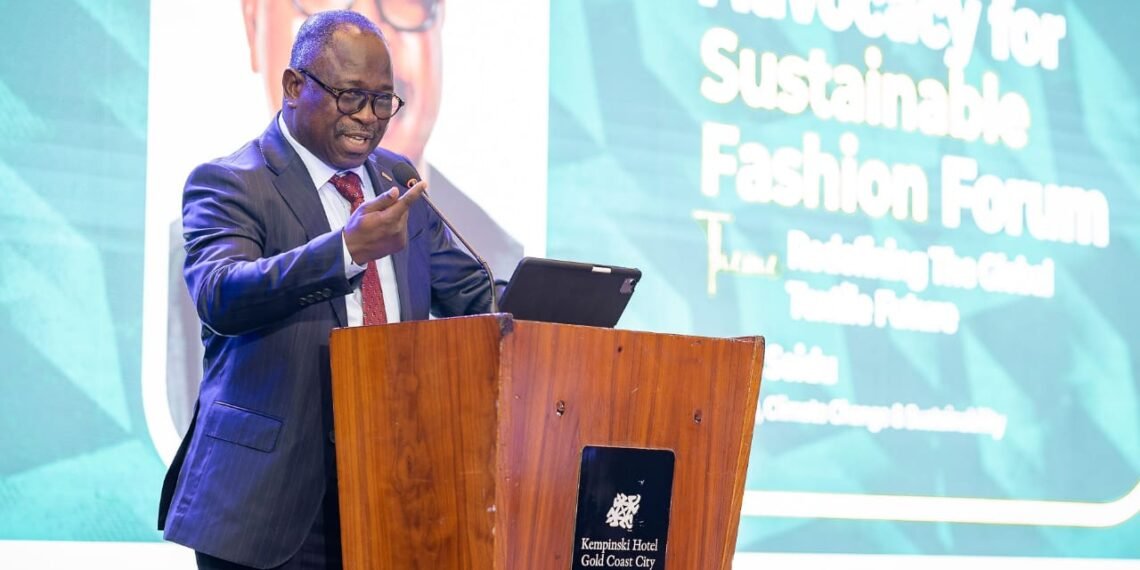Ghana is poised to lead climate action in West Africa with the government’s announcement of a groundbreaking initiative to establish a Climate and Sustainability Hub.
The announcement was made by the Minister of State for Climate Change and Sustainability, Hon. Seidu Issifu, during a high-level stakeholder engagement held in Accra.
The minister said the proposed hub will be the first of its kind in the sub-region and marks a decisive step towards cementing Ghana’s position as a continental climate innovation leader.
The initiative aligns with President John Mahama’s broader vision of tackling climate risks while unlocking green economic opportunities for sustainable growth.
“My vision is to establish a Climate and Sustainability Hub in Ghana. The hub will spearhead climate action, build capacity, and lead advocacy.
“It will drive research, conduct laboratory work, and champion initiatives that can attract funding and increase financial inflows into the country.”
Hon. Seidu Issifu, Minister of State for Climate Change and Sustainability
The proposed hub will serve multiple functions—research, capacity building, and policy advocacy—all intended to enhance Ghana’s climate resilience while creating opportunities for job creation and international investment.

According to Hon. Issifu, the facility will house researchers, sustainability professionals, environmentalists, climate entrepreneurs, and civil society actors who will collaborate on local and regional solutions to climate-related challenges.
It will also serve as a central point for coordinating national climate strategies, carbon markets, and adaptation programs.
“This hub will take the lead in the sub-region. This is the first time Ghana has a Minister of State specifically in charge of climate change and sustainability. Even in West Africa, we don’t see this anywhere else.”
Hon. Seidu Issifu, Minister of State for Climate Change and Sustainability
The establishment of the hub also responds to the urgent need for African-led solutions in the face of worsening climate shocks such as flooding, droughts, coastal erosion, and food insecurity.
Ghana has been identified as one of the countries most vulnerable to climate change in West Africa, making long-term resilience a development imperative.
The announcement comes on the heels of Ghana’s increased commitment to the Paris Agreement and its updated Nationally Determined Contributions (NDCs), which set ambitious emission reduction targets and focus on transitioning to a low-carbon economy through renewable energy, afforestation, climate-smart agriculture, and sustainable urban development.
Political Will and Institutional Reforms

Hon. Issifu used the engagement session to underscore the political commitment behind the creation of the new Ministry for Climate Change and Sustainability, saying it reflects President Mahama’s strategic vision for integrating climate resilience into the country’s development architecture.
“The President understands that climate change is not an environmental issue alone. It is an economic, security, and public health challenge.
“That’s why he created this dedicated portfolio and appointed a full Minister of State to drive Ghana’s agenda.”
Hon. Seidu Issifu, Minister of State for Climate Change and Sustainability
The Ministry, according to the minister, will work closely with sector ministries, academia, international development partners, and the private sector to roll out climate-smart policies and green financing schemes.
Hon. Issifu also indicated that one of the hub’s core missions will be to mobilize climate finance and technical support through partnerships with multilateral institutions, green investment funds, and philanthropic climate initiatives.
Ghana has previously lamented limited access to climate finance despite being a vulnerable country.
Through the new hub, the country will be better positioned to compete for funding under the Green Climate Fund, Adaptation Fund, and other global climate finance mechanisms.
“We must create a credible platform that attracts resources.
“With the hub in place, we can initiate scalable, bankable projects that respond to donor priorities while serving our people.”
Hon. Seidu Issifu, Minister of State for Climate Change and Sustainability
The stakeholder event concluded with strong endorsements from environmental NGOs, private sector actors, and academic institutions, who expressed enthusiasm about the hub’s potential to drive long-term systemic change in Ghana and beyond.
The announcement has already sparked regional interest, with climate stakeholders from neighboring countries signaling intent to learn from Ghana’s pioneering model.
READ ALSO: Ecobank Transnational Incorporated Withholds Dividend Payment Despite Stellar 2024 Performance




















